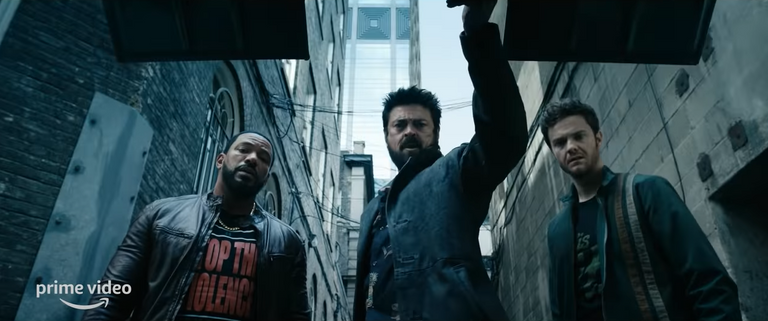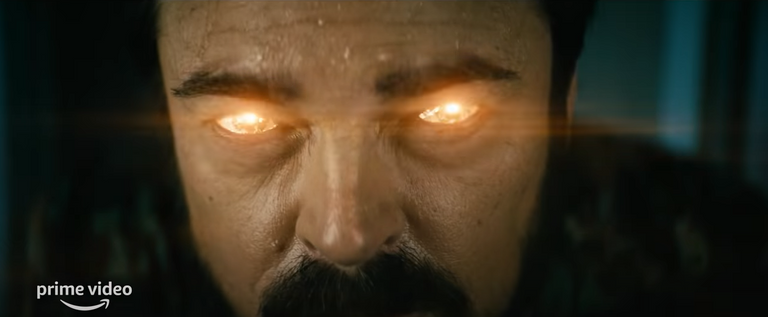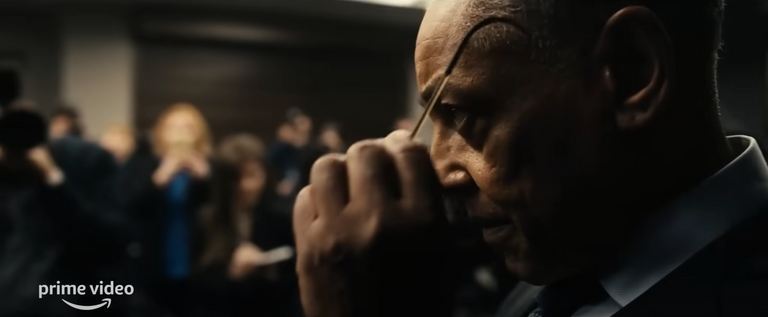[ENG] The Boys - Morality and its opposite

The Boys is a TV series that attracts, provokes, scandalises, revolutionises. The product in recent years not only catalyses our cognitive and affective attention as TV series viewers, but also transforms the way we understand plots and their relationship to reality outside the screen.
Time will tell whether this transformation will have been positive or not, but what matters is that as we try to determine what is right and what is wrong by analysing the actions of Butcher, Homelander, Edgar, Marvin, Hughie, Annie and all the others, our chance to hope for something better is consumed, because there is not a thing to be desired that The Boys does not offer.
Yes, this article is promoted and written by someone who loves this series and can't wait for the next season.
The Boys - What is true strength?

From a narrative and philosophical point of view, the first seasons of The Boys don't miss a thing. The protagonists of the TV series are confronted on a daily basis with the demons represented by the disparity of strength between those who do not have the powers granted by Compound V and those who do, with the consequences of fame, prestige and media relations, and they are confronted on a daily basis with their own inner demons, represented by their paranoia, fears and scepticism.
At the centre of this nihilistic and temporarily unresolvable cauldron, the protagonist Hughie Campbell finds himself catapulted between the loss of a loved one, involvement in a highly lethal covert operation (the group The Boys, to be precise) and amorous involvement with an Iowa Super, Annie January.
In the early seasons we have come to appreciate his naïve awkwardness as a counterbalance to the arrogant cynicism of Butcher, increasingly the anti-hero and new villain of the show.
If before, Hughie represented a bit of the good guy capable of containing Butcher's vengeful ravings, now he takes the master's values fully upon himself, consciously choosing to risk losing his life by injecting himself with the temporary V, a serum of unknown effects.
Now, Hughie takes on an irreversible power with the sole purpose of being the one to protect his beloved for once, and not always to be the one to be saved. But is this really the true meaning of the concept of power?
The Boys - Violence, power and morality

Always offered by Vought and the pornographic media masturbations it encourages on the one hand there is William Butcher, the violent, guilt-ridden anti-hero vigilante, and on the other there is Homelander, borderline, narcissistic and irreversibly antisocial.
Around their conflict, this season comes to life, comes alive, explodes like the entrails of those who die in the crossfire of their unreasonable rage.
In order to bridge the biological and constitutional gap that separates him from his nemesis, Butcher crosses every invisible line that ordinary humans draw by calling it morality and injects himself with the Temporary V serum to get on a par with his nemesis.
Unleashing Soldier Boy, the resentment he has accrued over the decades and his overflowing strength, Butcher establishes himself as a villain, and the final question The Boys leaves its addicted viewers with is: who is more villainous between him and the supervillain Homelander?
In all this heroic, brutal and utterly nonsensical welter that Vought does nothing but propel us through, the hypertrophy of the powerful and immoral self-celebrating is fragilely countered by the group's weak and balanced heroes, utterly powerless against those who crush the lives of others.
The dialectic between innocence and arrogance, between humility and arrogance, is also underlined by the perverse intergenerational relationship between Soldier Boy, Homelander and little Ryan, the son who has inherited the powers of the psychotic Superman offered by Vought.
Initially, the little boy feels positively attached to Butcher, who defends his interests after the death of his mother. Later, irreversibly, he is drawn to his father's will to power, which shows him that a life without fear, without weakness (and without morals) is possible.
What comes into play in his gazes, in Homelander's and in the fanaticism that Butcher follows by dragging Hughie along with him is the position of the man who tries to elevate himself (and succeeds) at the expense of those who are unable to rise above him; they stand below him, with their heads up, observing him, envying him, investing him with malice.
At the end of this visionary, philosophical and devastating lucubration that Vought passes off to us as nectar of the gods, what remains is the ultimate ethical dilemma, the one beyond which one cannot go without answering the deepest question: in all this blood, in all this will to revenge, in the horror, in the death, in the exhibitionism of an evil disguised as perfumed smiles, who is right and who is wrong? The one who rightly hates and takes revenge by any means or the one who has power and uses it?
While we die, scrambling to find an answer, they continue to hate each other, to narcissistically love each other, to bite back at the society that elevates them, with likes, with views, with comments and with mass adherence to the proposed ideal business model.
Does this remind you of anything, from everyday life, that Vought offers? While you think about it, line to the advertisement.
The photos have been taken from individual images from the trailer, available for free on YouTube or other sites.
[FR] The Boys - La morale et son contraire

The Boys est une série télévisée qui attire, provoque, scandalise, révolutionne. Le produit de ces dernières années ne catalyse pas seulement notre attention cognitive et affective en tant que spectateurs de séries télévisées, mais transforme également la façon dont nous comprenons les intrigues et leur relation avec la réalité en dehors de l'écran.
L'avenir nous dira si cette transformation aura été positive ou non, mais ce qui compte, c'est qu'en essayant de déterminer ce qui est bien et ce qui est mal en analysant les actions de Butcher, Homelander, Edgar, Marvin, Hughie, Annie et tous les autres, notre chance d'espérer quelque chose de mieux est consommée, parce qu'il n'y a pas une chose à désirer que The Boys n'offre pas.
Oui, cet article est promu et écrit par quelqu'un qui aime cette série et qui ne peut pas attendre la prochaine saison.
The Boys - Qu'est-ce que la vraie force ?

D'un point de vue narratif et philosophique, les premières saisons de The Boys ne manquent de rien. Les protagonistes de la série télévisée sont confrontés quotidiennement aux démons que représente la disparité de force entre ceux qui n'ont pas les pouvoirs octroyés par le Composé V et ceux qui les ont, avec les conséquences de la célébrité, du prestige et des relations avec les médias, et ils sont confrontés quotidiennement à leurs propres démons intérieurs, représentés par leur paranoïa, leurs peurs et leur scepticisme.
Au centre de ce chaudron nihiliste et temporairement insoluble, le protagoniste Hughie Campbell se retrouve catapulté entre la perte d'un être cher, l'implication dans une opération secrète hautement meurtrière (le groupe The Boys, pour être précis) et une relation amoureuse avec une Super de l'Iowa, Annie January.
Au cours des premières saisons, nous avons appris à apprécier sa maladresse naïve comme contrepoint au cynisme arrogant de Butcher, qui devient de plus en plus l'anti-héros et le nouveau méchant de la série.
Si auparavant, Hughie représentait un peu le gentil capable de contenir les délires vengeurs de Butcher, aujourd'hui il assume pleinement les valeurs du maître, choisissant consciemment de risquer de perdre la vie en s'injectant le V temporaire, un sérum aux effets inconnus.
Désormais, Hughie s'approprie un pouvoir irréversible dans le seul but d'être, pour une fois, celui qui protège sa bien-aimée, et non plus toujours celui qui est sauvé. Mais est-ce là la véritable signification du concept de pouvoir ?
The Boys - Violence, pouvoir et morale

Toujours offert par Vought et les masturbations médiatiques pornographiques qu'il encourage, il y a d'un côté William Butcher, le justicier anti-héros violent et culpabilisé, et de l'autre Homelander, borderline, narcissique et irrémédiablement antisocial.
Autour de leur conflit, cette saison prend vie, s'anime, explose comme les entrailles de ceux qui meurent sous les feux de leur rage déraisonnable.
Pour combler le fossé biologique et constitutionnel qui le sépare de son ennemi, Butcher franchit toutes les lignes invisibles que les humains ordinaires tracent en les appelant moralité et s'injecte le sérum Temporary V pour se mettre au niveau de son ennemi.
En libérant Soldier Boy, le ressentiment qu'il a accumulé au fil des décennies et sa force débordante, Butcher s'impose comme un méchant, et la dernière question que The Boys laisse à ses spectateurs accros est la suivante : qui est le plus méchant entre lui et le super-vilain Homelander ?
Dans toute cette confusion héroïque, brutale et totalement absurde dans laquelle Vought ne fait que nous propulser, l'hypertrophie des puissants et immoraux qui s'autocélèbrent est fragilement contrée par les héros faibles et équilibrés du groupe, totalement impuissants face à ceux qui écrasent la vie des autres.
La dialectique entre l'innocence et l'arrogance, entre l'humilité et l'arrogance, est également soulignée par la relation intergénérationnelle perverse entre Soldier Boy, Homelander et le petit Ryan, le fils qui a hérité des pouvoirs du Superman psychotique offert par Vought.
Dans un premier temps, le petit garçon s'attache positivement à Butcher, qui défend ses intérêts après la mort de sa mère. Plus tard, irrémédiablement, il est attiré par la volonté de puissance de son père, qui lui montre qu'une vie sans peur, sans faiblesse (et sans morale) est possible.
Ce qui se joue dans ses regards, dans ceux de Homelander et dans le fanatisme que Butcher suit en entraînant Hughie avec lui, c'est la position de l'homme qui tente de s'élever (et y parvient) aux dépens de ceux qui ne peuvent s'élever au-dessus de lui ; ils se tiennent en dessous de lui, la tête haute, l'observant, l'enviant, l'investissant de malice.
Au terme de cette lucubration visionnaire, philosophique et dévastatrice que Vought nous offre comme un nectar des dieux, il reste l'ultime dilemme éthique, celui au-delà duquel on ne peut aller sans répondre à la question la plus profonde : dans tout ce sang, dans toute cette volonté de vengeance, dans l'horreur, dans la mort, dans l'exhibition d'un mal déguisé en sourires parfumés, qui a raison et qui a tort ? Celui qui hait à juste titre et se venge par tous les moyens ou celui qui a le pouvoir et l'utilise ?
Pendant que nous mourons, cherchant une réponse, ils continuent à se haïr, à s'aimer narcissiquement, à mordre la société qui les élève, à coup de likes, de vues, de commentaires et d'adhésion massive au modèle d'entreprise idéal proposé.
Cela vous rappelle-t-il quelque chose de la vie quotidienne que Vought propose ? Pendant que vous y pensez, regardez la publicité.
Les photos ont été prises à partir d'images individuelle du trailer, disponibles gratuitement sur YouTube ou d'autres sites.

